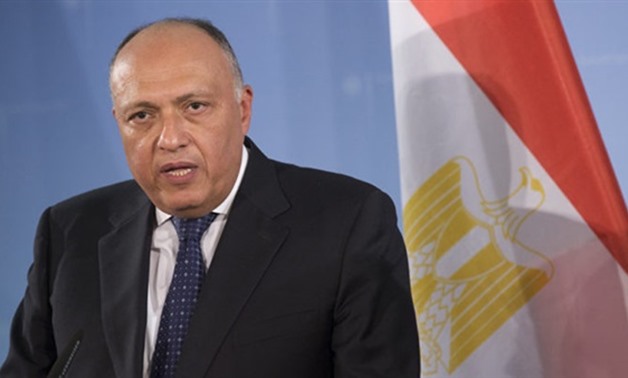
Egypt’s Foreign Minister Sameh Shoukry – press photo
CAIRO – 27 April 2018: Egypt’s Foreign Minister Sameh Shoukry will meet with the United Nations Special Representative in Libya and head of the UN support mission there, Ghassan Salame on Saturday for discussions on the latest developments in Libya, the foreign ministry said.
Salame’s visit will come following high-level discussions conducted between Egyptian officials and Marshal Khalifa Haftar, commander of the Libyan National Army, who visited Cairo on Wednesday.
It was the first appearance for the Libyan leader since he has been in France mid-April to conduct medical examinations, denying media reports that he experienced a stroke or a fatal disease.
Since the ouster of Libyan long-time leader Muammar Ghaddafi more than six years ago, the war-torn country draws wide international and regional attention, causing a serious threat on the national security of North Africa and Europe.
Libya, which is struggling to get through the critical political situation that it has been experiencing since 2011, is not only trying to unify its army, but is longing to revive its political functions by conducting presidential and legislative elections by mid-2018.
Egypt has hosted several meetings to bring the Libyan conflicted factions to the negotiations table, alongside members of Tobruk’s House of Representatives, to resolve the Libyan crisis and amend the Skhirat agreement, which aims at ending Libya’s civil war.
Haftar now controls the eastern side of Libya and works in cooperation with the government of the House of Representatives, known as the Tobruk government. He has been backed by Egypt and the UAE in facing terrorist groups that have plagued the country following the ouster of Ghaddafi.
Egyptian attempts to solve the crisis
Egypt’s officials held several meetings with their Libyan counterparts as well as members in Tobruk’s House of Representatives to resolve the Libyan crisis and amend the Skhirat agreement.
In December 2016, Cairo hosted a conference attended by Libyan officials and representatives from the country’s numerous factions, where they issued five proposed amendments to the agreement. The conference concluded with a decision to amend the eighth article of the Skhirat agreement that outlined the jurisdiction of the Libyan army chief commander.
Negotiations to unify the Libyan military were held as a part of Egypt’s initiative that kicked off in July 2017 to unify the military institutions. The first meeting aimed at creating a framework for the initiative while the second and third meetings were held in Cairo from Oct. 29 to Nov. 2, 2017, to follow up on the results of the first meeting.
The fourth meeting was held from Dec. 6 to 9 to restructure the Libyan army.
Egyptian Officials met again with Libyan military forces in Cairo on Feb. 21, 2018 in order to continue the discussions. The meetings delved into the methods used to unify and restructure the Libyan military forces after a long split that resulted from the outbreak of the Libyan revolution in 2011.
The sixth round of the negotiation on the unification of the Libyan military establishment was held on March 23 in Cairo.
In a press release issued at the conclusion of the meeting, the Libyan factions convening in Cairo agreed to resume with their talks in an attempt to complete the establishment of the four technical committees that the Libyan factions agreed on forming during the previous rounds of talks as an initial step towards the consolidation of the military establishment of Libya.
The meeting also concluded with reaffirming the participant’s keenness to move ahead with unifying the Libyan army whose top priority is to maintain and preserve Libya’s national security and peace and stand firm against foreign interferences.
Members of the Security Council welcomed recent efforts to strengthen an inclusive political dialogue among all Libyans, supported by Libya’s neighbors, international partners and regional organizations within the framework of the Libyan Political Agreement endorsed by UN Security Council Resolution 2259.

Comments
Leave a Comment